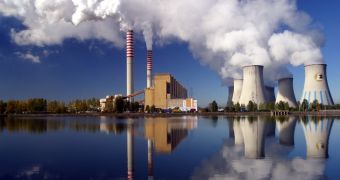According to a new paper published in yesterday's issue of the journal Technological Forecasting and Social Change, the time has come for coal-fired power plants to be humanely put to sleep. Besides, this should be done sooner rather than later in order to avoid economic losses.
In this report, researchers with the International Institute for Applied Systems Analysis (IIASA, for short) argue that, according to evidence at hand, global warming can be limited to just 2 degrees Celsius if and only if human society stops burning coal for energy.
The problem is that, the more lawmakers and high officials wait to implement measures intended to force coal-fired plants into retirement, the more such facilities will be either up and running or under construction around the world.
This means that, at the time the legislation needed to limit global warming to 2 degrees Celsius is implemented, the planet will be home to quite a lot such highly polluting facilities. At that point, damage control financially-wise is likely to prove quite a headache.
“If we are serious about meeting climate targets, then the reality is that eventually we will have to start shutting down coal-fired power plants. But the longer we delay climate action, the more stranded capacity we'll have,” researcher Nils Johnson said in a statement, as cited by Science News.
“Delaying action encourages utilities to build more coal-fired power plants in the near-term. Then, when policies are finally introduced, we have to phase out coal even more quickly and more investments go to waste,” the specialist went on to explain.
In their paper in the journal Technological Forecasting and Social Change, the IIASA researchers explain that, as shown by several studies, coal-fired power plants are a major source of greenhouse gas emissions. Still, plans are now being made to erect many such facilities across the world, especially in China and India.
These plants are designed and built in such ways that their lifespan should extend over some 30-50 years. Besides, they only begin to pay off for the initial investments after a few years of operation. Should strict climate policies make coal power no longer competitive, newly built plants will likely find themselves idling. This would translate into significant losses for owners and investors alike.
The IIASA specialists say that, according to evidence at hand, some 37% of the planned global investment in coal power over the next 40 years might go to waste unless action against this dirty power source is taken immediately, and that China and India will be the ones hit the hardest.
In light of these findings, the researchers recommend that efforts be made to halt the expansion of the coal power industry, and that investments be instead made in other energy sources that do not cause as much pollution as such facilities do. They add that promoting energy efficiency would also help.
Although carbon capture and storage could help improve on the ecological footprint of coal-fired power industry, the scientists argue that, in order to halt global warming to 2 degrees Celsius, hundreds of power plants would have to be retrofitted within a short time span. This would put a lot of strain on carbon capture and storage technologies, and might not prove a viable option on the long run.
“CCS [carbon capture and storage] could buy us time, but what if it doesn't work? It's a risky strategy,” said researcher Volker Krey. “The best strategy would be to stop building new coal power plants starting today,” added Nils Johnson.

 14 DAY TRIAL //
14 DAY TRIAL //